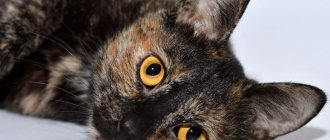Good afternoon, dear owners of meowing brothers!
Does your cat walk around and meow for no reason? It can't be without a reason. Perhaps he simply does not have obvious reasons to “whine and cry”? After all, he is healthy, well-fed, full of toys and petting and playing is always welcome!
Naturally, such behavior will sooner or later begin to annoy. But being angry with your pet is not productive for you and is contraindicated for him, because he already feels bad. And he reports this persistently and persistently!
Why do adult cats scream?
Don't think that your cat is yelling for no reason.
It definitely exists and there can be quite a lot of reasons for restless behavior. Of these, the most common ones can be identified. Lack of attention is the most common reason when a furry lady meows constantly and follows her owner around. Most often, this situation arises if another pet appears in the house. That's when she perceives him as a competitor. Moreover, the owners themselves begin to devote a lot of time and care to the new one, slightly relegating Murka, who was always alone and received all the caresses individually, to the background.
Over time, this may pass, but don’t forget about it, pay attention too. If she is the only pet in the house and the cat screams at night, then there is no need to indulge these demands. With the onset of heat, the kitty may scream for the cat
The cat's body is designed in such a way that estrus can happen at any time of the year and the mating instinct cannot be extinguished. There are, however, special supplements that can be bought at a veterinary pharmacy. They will be a good option if the animal is domestic, and you do not want to regularly invite the cat to her, and then mess with the offspring
With the onset of heat, the cat may scream for the cat. The cat's body is designed in such a way that estrus can happen at any time of the year and the mating instinct cannot be extinguished. There are, however, special supplements that can be bought at a veterinary pharmacy. They will be a good option if the animal is domestic, and you do not want to regularly invite the cat to her, and then mess with the offspring.
And the last reason that a cat yells lies in its upbringing. But here only the owners are to blame, who indulged all the whims of the fluffy beauty. It has been noticed that often the cause of screaming can be a transition to a different diet. There are specimens that completely refuse new food, scream, but starve. Here the breeders themselves are late with education, they will have to give in. It is impossible to change an adult cat.
How to suppress aggression and calm down
The better the owner prepares his animal for the show, the calmer he will be at the show itself.
Read also: 10 reasons why you are a loser
You can quickly suppress aggression in an adult animal like this:
- Wear thick clothes and thick gloves, take a blanket and wrap the aggressive cat, holding him in your arms until he is completely calm.
- Spray the cat with water.
- Leave the animal indoors for a while, during which time the anger will gradually subside.
- Don't look the cat in the eye.
- Prepare in advance a place in the room where the pet can hide.
- Do not punish your pet - punishment will only provoke a repeated attack of anger.
The cat is running around the apartment - why is he doing this?
Throughout their existence, cats have earned the favor of people due to their attractive appearance and unique character. Many also know that there is a sign that speaks of the healing properties of such animals. That is why today such pets are owned by a large number of people who love them with all their hearts and are attentive to their health.
Why does the cat constantly run around the apartment, yelling, licking and biting?
However, there are times when strange behavior in pets causes concern for the owner. Suddenly the cat runs around like crazy and meows, and sometimes even shows aggression, which certainly infuriates its owner.
Often the animal feels anxious at this time, which may indicate a deterioration in its health. In such cases, it is recommended to devote significantly more time to your pet than usual. It is necessary to take care of it, play and delight it with new toys, which can also significantly improve the animal’s mood.
If your cat is running around the apartment like crazy, you should examine his health status.
Often cats show vigorous activity for only 10-15 minutes. However, in the case where it lasts longer, it is necessary to find out the reason for the sudden attack of frenzied behavior.
It is especially important to know the main reasons why a cat runs around the yard or apartment
The cat wants to go outside
Quite often, owners who live in apartment buildings have the habit of walking their cats in the fresh air. And if a cat is running around the house like crazy, this may indicate that the pet needs to go outside. Also, the desire to leave the house may be due to the fact that the animal is trying to find a female for fertilization.
Cats, like cats, can be quite restless, and this behavior escalates in the spring. Running around the apartment may be accompanied by other problems in their behavior. Pets can damage furniture, make loud noises at night, and even become aggressive.
Important! During this period, experts recommend using sedatives in small quantities, which they usually give to pets in large doses to administer anesthesia.
Pet nervousness
If he feels anxious or is very frightened by something, he can also run around the apartment, hide, fluff his tail and even bite his owners, thereby showing excessive aggression.
How to protect a cat from household members
In such cases, it is recommended to calm the animal as soon as possible by protecting it from household members using a carrier or cage. Afterwards, it is imperative to go to a veterinary clinic, whose specialists must diagnose the cat’s health condition.
The cat wants to go to the toilet
Often cats, before relieving themselves, begin to show increased activity, running around the house. To date, experts cannot establish the reason for this behavior, however, there is an opinion that running contributes to a quick and painless trip to the toilet.
This assumption is explained by the fact that the active running of the animal stimulates the peristalsis of its intestines, as a result of which the cat rarely has problems during times of need.
The cat is trying to clean his butt
Regardless of the thickness of the fur, various miniature-sized objects, such as pieces of napkins or Christmas tree tinsel, often stick to the pet’s butt. The animal does not feel comfortable at this time, and in order to get rid of unwanted objects, the kitten rushes like crazy from room to room.
That is why, if a cat behaves strangely, the owner needs to diagnose the entire body of the pet for the presence of foreign objects that may bother him.
Wall or void
The process when a cat looks at a wall or in a corner is reminiscent of meditation. A cat's brain is the size of a walnut. And a cat thinks no less than ours, and also draws conclusions. But the instincts of the pet take over everything; he will look at the wall, since any point on it serves as a hypothetically moving object. And if she also moves her paws, then she is potential prey.
Also, a cat and a cat can stare into space for a long time. What is emptiness for humans is not always the case for cats. A tiny ray of light can play its game in space, or some small object casts a shadow, and it trembles. Or a light breath of wind blows crumbs across the floor, creating the effect of a living creature.
There is an opinion that cats are able to see brownies, ghosts, otherworldly entities, incorporeal creatures from a parallel world. The cat is an ancient animal that came to us from the distant past and preserved religious things from there. Anything is possible. No one can confirm this hypothesis, nor can anyone refute it, why a cat is the first to be let into a new house.
Caprice or illness
A cat can not only look at the wall, but also rest its head against it, while still growling and releasing its claws. The Internet is teeming with photos and videos of a tailed pet resting its head against a wall or corner. Looks funny. But in most cases, such behavior of a cat’s pet is a fairly serious signal of its ill health.
For example, in the absence of the owner, the cat jumps and runs around the house. Cat Kevin McCallister “home alone” can fall off a shelf and land on his paws, fail to fit into a kitchen corner on sharp turns and hit a corner, or get a huge slap on the head from an overturned hard object. Finally, the same wall can cause illness. The cat ran and hit his head against the wall with all his might.
A cat can complain of being unwell using “meow-meow”, but it won’t help, people don’t understand. When the animal runs into a wall, it complains of pain in the head. The wall is a cat's assistant - it tells the owner what is hurting his beloved cat.
A person often notices something similar behind himself. When he has a headache, he wants to push it against the wall. A hard wall seems to be able to drown out the pain in my head. In the case of a cat, the wall seems to scream that the family pet needs medical attention.
We recommend reading: Jagdterrier standards
There was a situation when a cat fell out of a high-rise building window. He survived, they picked him up, carried him into the apartment and released him, he crawled to the wall and rested his head against it. At a veterinarian's appointment, the cat's owners learned that their pet had a concussion.
In addition to a concussion, the reasons for a cat running into a wall can be various poisonings, metabolic disorders, nervous shock, and worst of all, tumors of the brain or spinal cord . You definitely need to contact an experienced veterinarian and, when all the bad things are behind you, your pet will again enjoy life, watch its “cartoons” on the wall and gratefully purr fairy tales in the ear of its beloved owner.
A cat can not only look at the wall, but also rest its head against it, while still growling and releasing its claws. The Internet is teeming with photos and videos of a tailed pet resting its head against a wall or corner. Looks funny. But in most cases, such behavior of a cat’s pet is a fairly serious signal of its ill health.
The cat is constantly yelling. What to do?
It’s not pleasant that your pet is constantly yelling. But what to do in this case? Fight or let it slide? First you need to find out the reason, maybe you will find it after all. In fact, cats have few needs: feed her if she’s hungry, cuddle her if she’s bored, play if she’s in a playful mood. It's nothing big for you, but it means so much to the animal.
Perhaps it’s enough for the cat to buy a new toy, treat or vitamins.
On your part, of course, attention and a little patience are required. It just seems that she is indignant constantly and for no reason
They exist, but they are probably not on the surface. Start with yourself; screams and high-pitched meows may be the result of the upbringing that you have instilled in the animal from the age of a kitten. A spoiled pet behaves no better than a spoiled child.
What does it mean if a cat walks sideways?
Why do cats, when scared, stand sideways, arch their backs and go towards the offender? ... The cat thus sends threatening warning signals. This is both attracting attention to itself, and a requirement to move away, and a sign that the animal is ready to move from defense to attack.
Interesting materials:
How much oil should there be in the air conditioning compressor? How much does an air conditioner line cost? How much does it cost to install an air conditioner in Moscow? How much does it cost to refill an air conditioner with freon? How much does it cost to refill an air conditioner? How much electricity does an air conditioner consume? How much does an air conditioner cost on average? What are the advantages of an inverter air conditioner? What month is the best month to buy an air conditioner? Why charge your air conditioner with freon?
To talk about feeling unwell
Unfortunately, it is not always easy to eliminate the cause of meowing, especially if its frequency and volume are unusual. If your pet vocalizes at night, he may be trying to tell you that something is wrong. In fact, with many conditions, from kidney disease to urinary tract problems or arthritis, cats meow for help. If it seems to you that your cat is making unusual sounds, it is better to contact your veterinarian so that he can identify a possible disease. However, keep in mind that cats are good at hiding pain. And if they are silent, it does not mean that they are comfortable.
If your pet is older, a common cause may be cognitive dysfunction syndrome. Meowing at night is just one of the symptoms, so consider visiting a doctor.
Hunger
A hungry cat makes sounds that sound like a baby crying. In this case, eliminating the cause of this behavior is quite easy; you just need to feed the animal. Often kittens cry due to malnutrition. They often feel hungry because their growing bodies require nutrients. Owners need to learn the rules for creating a cat menu and feed their pet on time. Sometimes owners mistakenly believe that they are giving the animal enough food.
However, there are times when a cat has just eaten, but runs around the table with human food and screams. “Why does the cat meow for no reason?” — this is the question the animal owners ask. This can be explained by the fact that pets are very gluttonous. Cats may beg for food when they smell delicious smells. In this case, you should not follow the animal’s lead. The pet should be taught to eat at strictly defined hours.
Cats often meow when their owners frequently change the types of food they eat. After all, the pet’s body gets used to certain foods. It is especially undesirable to alternate the intake of dry ready-made food and food from the human table. This can lead to digestive problems.
Folk remedies for fighting orom
The nightly concerts of pets get on the nerves so much that their owners, despairing of finding a radical remedy, are finding their own ways to calm the “singers”:
- Spray bottle with water. It has been noticed that if you specifically spray water on a cat’s tail, its owner will have no time for songs. For some time he will be busy licking his main decoration and will calm down for a while. If after this he starts yelling again, threaten him with a spray gun. Most likely, the cat will hide in a secluded shelter and soon fall asleep.
- A game. If your pet is not in nature and is forced to spend all his time within four walls, he has no way to relieve excess energy. Outdoor games can help with this - only, of course, not at night, but shortly before you go to bed. Having had a good run and relieved the accumulated tension, your pet will sleep without its hind legs. If you have neither the energy nor the time to play, hang two or three toys near you on strong laces - the cat, rejoicing that you are watching him, will happily catch them, and having had enough fun, he will fall sound asleep.
- Nutrition adjustments. Save the largest portion of cat food for evening feeding. Having properly refreshed himself, the cat will sleep soundly until the morning, completely forgetting about vocal lessons.
How to stop a cat from jumping on walls?
I have a British cat (8 months old) who jumps on the walls and tears up the wallpaper. I don't know how to wean him off this. He sharpens his claws on everything: furniture, walls. We bought a claw hammer, but he doesn’t accept it. What to do? please advise.
Provide your cat with as many opportunities as possible for movement and “acrobatics” - all kinds of play complexes - bought in a store or made with your own hands - will seriously entertain your cat for a long time - it will be much more pleasant for him to climb up a pipe wrapped in hemp rope than to tear wallpaper. Cats love to move and jump a lot. Aboriginal breeds such as the Kuril Bobtail also dive into the water for fish, and in an apartment, within four walls, cats are very bored, hence the jumping on the walls and striping the wallpaper.
I have a British cat (8 months old) who jumps on the walls and tears up the wallpaper. I don't know how to wean him off this. He sharpens his claws on everything: furniture, walls. We bought a claw hammer, but he doesn’t accept it. What to do? please advise.
Common Causes
If you figure out why your pet shows negative emotions, you can avoid conflict and even traumatic situations.
Defense: self, cubs or territory
Not only dogs, but also cute fluffies are able to protect themselves, kittens or their territory from surrounding people or animals. The adult feels like the owner of the home, and therefore experiences irritation if someone wants to encroach on it.
The furry friend will use terrifying sounds to drive uninvited guests out of his territory. Mothers are especially active, who in this way try to drive the stranger away from the nest with kittens.
Manifestation of fear
Specific sounds can be caused by certain fears of the cat, which are usually associated with insufficient socialization or regular physical punishment. The fact that deviations in behavior are provoked by a feeling of fear is indicated by warning poses (standing sideways, half-turned), attempts to inflict injury with claws, and subsequent demonstrative licking of the fur.
A pet may hiss at a vacuum cleaner, at loud guests, or at an unexpected sound or touch. Fright is often accompanied by a fluffy tail.
Aggression
Sometimes a cat's hissing is explained by an aggressive attitude aimed at a specific person or animal with which negative memories are associated. For example, a guest could step on a tail, paw, or offend during a previous visit. Or the neighbor's dog is constantly trying to catch up and sniff the mustache.
The owner himself is capable of provoking aggression. Sharp shouts, frightening gestures or trips to the vet are good enough reasons for a mustachioed friend to hiss. If a pet has not experienced tenderness and affection from a person since childhood, then he will begin to scream and hiss at him during any attempts to get closer.
Unmotivated aggression is often caused by sexual desire or hormonal imbalance. If a cat hisses at everything for no reason or reason, it is better to take him to the vet and have him neutered. The same applies to females.
Illness or state of anesthesia
If a gentle and affectionate purr begins to demonstrate repeated aggressive behavior, this may indicate the presence of health problems. Among the diseases that accompany inadequate reactions are:
- food and chemical poisoning;
- epilepsy;
- toxoplasmosis;
- hormonal disbalance;
- rabies.
An injured animal, in pain, will hiss and growl at a person who wants to help. Operated pets who have not fully recovered from anesthesia and have lost the ability to navigate in space react the same way.
Trying to communicate something
Sometimes a cat is forced to hiss to attract the owner's attention. This happens after a mustachioed friend called out to a person by meowing repeatedly, but he did not respond.
In this case, the fluffy feels displeased and makes frightening sounds.
This behavior is most often demonstrated by poorly raised or overly spoiled pets. If the mustache constantly behaves this way, then measures must be taken to re-educate it.
How to tell if your pet is afraid
All frightened animals behave the same way. Their fear manifests itself through a set of the following external signs:
- pressing the ears to the head;
- fluffing or pinching of the tail between the hind legs;
- arching your back and freezing in place;
- a plaintive meow or a threatening hiss;
- attempts to run away or hide in a dark place;
- compulsive licking;
- change in appetite (refusal to eat or uncontrollable eating);
- relieving yourself past the tray;
- being pulled out of hands when trying to hug;
- sudden jumping up upon direct contact with an irritant.
Much of the above coincides with signs of aggression. This similarity is explained by the fact that the best defense is an attack.
Why is my cat screaming?
Details Created 07/29/2015 17:54
Why is my cat screaming?
There are several reasons for this behavior.
Another reason for frequent meowing may be the fact that many cats are very talkative. They love to talk, tell stories, sing songs to the owner at any time of the day, without asking the owner whether he needs it or not? In this case, it doesn’t really matter what the owner is doing: sleeping, eating, watching TV or reading a book.
Pets love to talk especially loudly about going to the toilet. Having done all the work in the toilet, they can talk about it even louder.
Another reason for a cat to loudly declare itself may be the desire to beg for food. However, the cat may not necessarily be hungry. In her opinion, it is also not bad to enjoy something tasty on a full stomach.











